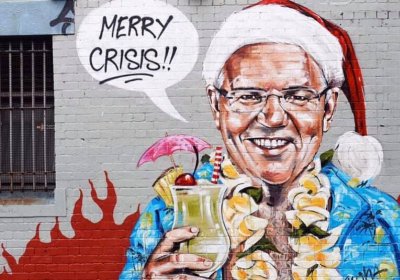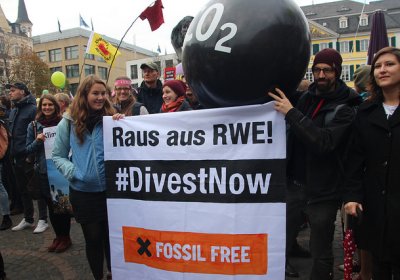John Englart died unexpectedly at his Fawkner home with his beloved chihuahuas, Juliet and Jones, close by. Andrea Bunting writes about the life of this leading campaigner for social justice and climate action.
Andrea Bunting
Brunswick residents, who have been battling to stop a Bunnings Warehouse from being built in a residential area for nearly two years, have won. Andrea Bunting reports.
Following the recent bushfire crisis and the upsurge in climate concern, Prime Minister Scott Morrison wants to give the impression that he is acting on climate change. Climate Action Moreland's Andrea Bunting debunks 14 claims made by his Coalition government.
Another United Nations climate conference (COP23) is over — though many people would have barely noticed, given the lack of media coverage. The Paris Climate Agreement is locked in and, contrary to the Coalition’s inetrpretation, Australia needs to ratchet up its emissions reduction.
This is a useful time to reflect on where Australia sits globally on climate action and what areas are of concern.
Australia’s behaviour at the UN Climate Conference in Bonn (COP23) has been described as that of a bully. Australia has collected a swag of “Fossil of the Day” awards — given daily by climate activists to the country or group doing its best to stop effective action on climate change.
Australia, along with the US, has been disgracing itself in one of the most contentious areas of the climate talks, known as Loss and Damage. Other developed countries, particularly the European Union and Canada, have not been very helpful either.
The United States is now the only country trying to undermine the Paris Agreement on climate change. While other countries are pledging to cut their emissions — often inadequately, but at least accepting the need — the US intends to raise them.
Meanwhile, the US is taking a step forward on the geoengineering path. Geoengineering, specifically Solar Radiation Management (SRM), refers to large-scale human interventions into the Earth’s climate. These aim to cut the levels of solar radiation that reach the Earth’s surface to artificially cool the planet.
Climate activists awarded Australia the very first “Fossil of the Day” at the UN Climate Conference in Bonn, being held from November 6-17. This award is given daily to the country judged to be doing the best to block effective progress on climate change.
Australia got the award for actively supporting the development of coal mining in the Galilee Basin, particularly the Adani project. Fittingly, Australia was presented the award by Pacific Islanders, who are very vulnerable to climate change impacts.
It’s that time of year again when countries get together to discuss taking action on climate change. Progress is painfully slow at these United Nations Climate Change Conferences (known as COPs). We are up to number 23 — hence it is called COP23.
COP23, held in Bonn, Germany from November 6-17, is not as significant as COP21 in 2015, when the Paris Agreement was negotiated. Much of this year’s conference is concerned with fleshing out details of the Paris Agreement, the so called rulebook, for adoption in 2018.
Finally, the federal government has a policy for the electricity sector: the National Energy Guarantee. (NEG. Did it think this one through?)
It is, effectively, an emissions trading scheme applied to electricity. It is similar to other schemes — the Clean Energy Target (CET) and the Emissions Intensity Scheme (EIS) — supported by Labor.
In Australia, the National Electricity Market is rapidly becoming dysfunctional, with power shortages, blackouts and soaring prices making headlines.
Private companies are refusing to invest in new fossil fuel generators to replace those that have closed. This “investment strike” is due partly to uncertainty about carbon pricing and partly to increasingly volatile spot prices received by generators.
Australia’s Chief Scientist Alan Finkel presented the Blueprint for the future: Independent review into the future security of the national electricity market, known as the Finkel Review, to the Council of Australian Governments (COAG) Leaders’ meeting on June 9.
The mainstream media has focused on one recommendation — a Clean Energy Target — and the Coalition’s reaction.
Readers may have noticed that Australia is in the midst of an energy war. On one side are right-wing commentators attacking renewable energy at every turn. On the other side are renewables advocates, quick to retaliate, sometimes without considering the whole story.
- Page 1
- Next page











